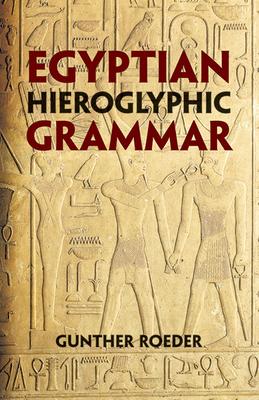Written and spoken for about 4,000 years, Egyptian is no longer a living language (Arabic is the major language of modern Egypt); however, ancient Egyptian is still studied by Egyptologists, historians, archaeologists, and students interested in the age-old civilization along the Nile.
Typically, students of ancient Egyptian begin with Middle, or Classical, Egyptian, which was written in hieroglyphic script. Middle Egyptian is especially important because it is the language in which many important literary works were written. Moreover, when it was no longer spoken, Middle Egyptian continued to be taught in temples and schools as a vehicle of literary and liturgical expression.
This compact handbook, by a noted German Egyptologist, was specially designed for beginning students who wish to acquire enough basic knowledge to enable them to read the easier hieroglyphic texts. Toward that end, the author begins with a general discussion of Middle Egyptian and its script, followed by concise, accessible lessons in phonology, formation and usage of nouns and other parts of speech, and syntax. With careful study, the student should be able, even after the first lesson, to translate simple sentences independently. A list of hieroglyphs, a vocabulary section, and reading exercises complete this handy manual that offers students quick and easy access to the language and culture of ancient Egypt.

Egyptian Hieroglyphic Grammar: A Handbook for Beginners
Written and spoken for about 4,000 years, Egyptian is no longer a living language (Arabic is the major language of modern Egypt); however, ancient Egyptian is still studied by Egyptologists, historians, archaeologists, and students interested in the age-old civilization along the Nile.
Typically, students of ancient Egyptian begin with Middle, or Classical, Egyptian, which was written in hieroglyphic script. Middle Egyptian is especially important because it is the language in which many important literary works were written. Moreover, when it was no longer spoken, Middle Egyptian continued to be taught in temples and schools as a vehicle of literary and liturgical expression.
This compact handbook, by a noted German Egyptologist, was specially designed for beginning students who wish to acquire enough basic knowledge to enable them to read the easier hieroglyphic texts. Toward that end, the author begins with a general discussion of Middle Egyptian and its script, followed by concise, accessible lessons in phonology, formation and usage of nouns and other parts of speech, and syntax. With careful study, the student should be able, even after the first lesson, to translate simple sentences independently. A list of hieroglyphs, a vocabulary section, and reading exercises complete this handy manual that offers students quick and easy access to the language and culture of ancient Egypt.